 One of the marks of a healthy, growing church is a strong small group Bible study ministry. These small groups build relationships that support the other work of the church and develop mature believers who can confidently handle the Word of God.
One of the marks of a healthy, growing church is a strong small group Bible study ministry. These small groups build relationships that support the other work of the church and develop mature believers who can confidently handle the Word of God.
But what happens when a global pandemic (or some other outside influence) means you can’t meet together in person? How do you continue your small group ministry when your group is scattered?
While we often bemoan the influence that technology has had on our homes, families and attention spans, this is a time when we can celebrate the benefits of technology to bring us back together. Using the internet and some simple apps and services, you can conduct your small group Bible study online, and you may actually find that your group connects more deeply than ever before.
Decide on your format
Before you get started, you’ll need to decide on your goal for taking your small group ministry online. Are you just trying to replicate the face-to-face weekly meeting? If that is the case, there are a number of video conferencing software programs that can be used for online meetings.
Video-Conference Options
Google Hang-outs is available if you have a gmail account, and it has a paid version with G-Suite that can be used for up to 100 participants on the $6/month plan. Only the host needs to have the plan.
Slack also has video-conferencing available in its paid plan, but each team member needs to have a plan.
Facebook has free video chats, but very limited other features in just the one-time video chat.
My favorite is Zoom. For $15/month one host can join and up to 100 people can join a video conference, which can be recorded and shared with people who miss the conference. The audio and video quality are very good and the connections are usually stable if you have strong internet service. The user and host interfaces are simple to use.
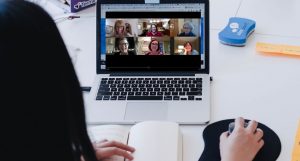
All of these services have different combinations of options and add-ins (recording, file storage, chat, host controls, etc.) at different price points, so if you are just wanting to schedule a weekly video conference in place of your weekly face-to-face meeting, you’ll find one of these will suite your needs and your budget.
Online Groups
There are many benefits of taking your members into an online group platform. A group platform allows everyone to interact at different times. It provides a safe, private space to ask questions and wrestle through the material together through out the week. You may find that with more frequent interaction, your group grows closer online than they even did in person.
There is something freeing about having a screen between yourself and the other people in the group. Many people will be more willing to share things they would be embarrassed to say face-to-face, and this transparency can lead to deeper relationships. (There are also some down sides to this, which I’ll discuss below.)
As with video conferencing, there are several online group platforms with different types and combinations of functions. Slack is good for group interaction as well as video-conferencing. Band is a free and secure group communication app with a broad range of features. Mighty Networks is another platform that include file storage and forums for group members and the free version would work for most small groups. And apps like WhatsApp, Telegram and Group.Me all have basic group communication functions.
But the most widely used group platform is Facebook Groups. It’s free, stable, widely-available and easy to use. While the rest of this post will be based on my experience with conducting small groups through Facebook, most of the principles apply in other platforms as well.
RESOURCES
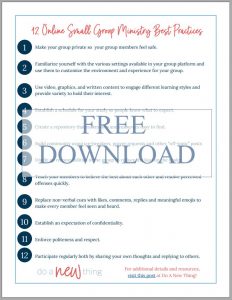
 Download the free 12 Best Practices for Online Bible Study Groups and get 10 ice breaker graphics you can use in your group!
Download the free 12 Best Practices for Online Bible Study Groups and get 10 ice breaker graphics you can use in your group!
Preparing and Planning for the Group
Setting up a group in Facebook is easy. When you first open the group, use the settings to make it Private and Visible. This means people can see the group and request to join and you can approve their request. You can invite people who are your Facebook friends, or give people a link to find the group, or they can search by the name of the group. Once everyone is in, change the settings to Hidden to keep your group secure. (Facebook limits how often you can change between Visible and Hidden, so don’t change it until you are ready!)
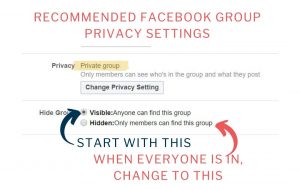
Decide how your group will flow. Will you have just one group meeting time each week so that everyone shows up at once? Or conversation about the material throughout the week? Will you restrict the posts so only the leaders can start new posts, or allow anyone to start a post? Will you focus only on the study material, or allow other off-topic conversation (like prayer requests, personal updates, etc.) as well? This may be an opportunity to build closer connections among your community than if you were only meeting once a week.
Establish a schedule for your study. Make sure your people know what to expect when. If they are all new to online groups, they may have many questions about how it will all work. Be sure to over-communicate so they can focus on the study, not the logistics of this new experience.
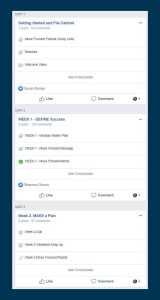
Create a repository for resources people will need during the study. You can use the Files function to upload documents. If you have several documents for people to access, you can upload them to Google Drive or Dropbox and then put a link to each one in a Master File document. Facebook Groups also have a social learning function called Units. You could create a Unit for each week of your study with all of your posts for that week organized in the Unit. That keeps your group neat and tidy and it’s easier to find things.
Group Leadership
Leading a study in a Facebook group is a little bit different than leading face-to-face and you may need to adjust your leadership style for the most effective study.
Use a mix of video, graphics and written content to reach multiple learning styles and hold everyone’s interest. If you are teaching in your group, you can use the video chat function where everyone can get on live at once to hear your teaching. Or you could do a Facebook Live for your teaching and everyone can comment under it. This allows people to watch your teaching whenever it is convenient for them.
Provide community-building activities (ice breakers, prayer requests, etc.) to develop stronger connections in your group, in addition to study materials. This will take the place of the friendly conversations that happen around the room before and after a face to face study group starts.
Divide up responsibilities in the group. It lightens the load on the leader and provides a development opportunity for growing new leaders. Consider someone to lead ice breakers, prayer requests, a weekly worship moment, etc.
When a new group forms or new members join later, consider doing something to feature each member in some way. This helps everyone to get to know the members of the group.
Group Behavior
Just like leadership is different in a group, so is participation. If your group has never done online Bible study before, they may be unsure how to interact.
Believe the best. Written content can be easily taken out of context or read with an unintended tone. Remind your group members to offer grace and believe the best in each other. If something “said” causes offense, address is quickly before conflict causes broken relationships in the group. Be prepared to have a leader or other admin monitor all of the activity in the group so these things don’t get out of hand.
Replace the non-verbal cues. Connecting online is different than in face to face groups. We can’t see the nods of agreement and affirmation, the leaning in to pay attention or the eye contact that makes people feel seen. In the online world, liking, replying to posts and comments and the use of meaningful emojis replace those non-verbal responses. A simple like can go a long way in helping everyone in the group feel heard and connected.
What is said in the group stays in the group. Your members will interact more freely and share more intimately when they feel safe in the group. Everyone should know that there is an expectation of privacy and confidentiality in the group.
Enforce respect and politeness. Even well-meaning Christian people will say things in an online group that they would not say face to face. Everyone’s opinion matters, there are no dumb questions, and we can disagree without being disagreeable. It’s good idea to read what you have written twice before hitting that send button.
Just like any community, you get from an online Bible study group what you put in. So if you and your group members want connection, you all need to participate regularly. And not just sharing your thoughts, but replying to others as well.
When the crisis is over and we can all start meeting together again, you may just find that you don’t want to give up the close-knit community you’ve developed in your online group.
Thanks to Katrina Wylie and the rest of my teammates on the Proverbs 31 Ministry Online Bible Studies Executive Team for collaborating with me on these best practices.
What other ideas do you have for churches and ministries who can no longer meet together? Let’s share and support one another!
3 thoughts on “How to Run Your Small Group Ministry Online”
Leave a Comment
Is your to-do list out of control?
Grab my best to-do list tips and learn to overcome the de-railers in your week
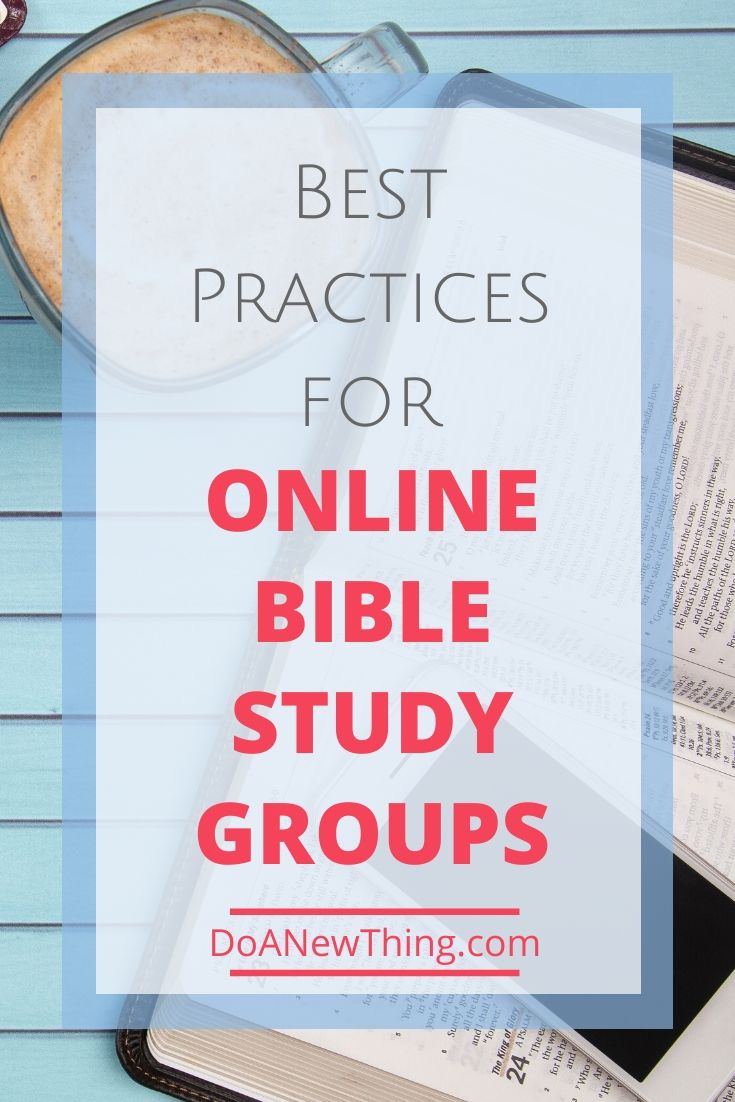


I have used Zoom for different things! It’s great! The hard part is to reach the ladies at church who don’t have a computer. I don’t want to leave them out!
I’m just held my first test Zoom run for a Bible study I’m doing Friday. One of my older ladies without a digital device was able to phone in. Zoom says they’ve discontinued that but she had no problem.
We are definitely doing a lot online as a church!